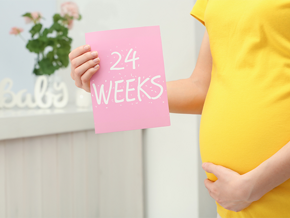
8 Weeks Pregnant: Your Guide to Symptoms, Baby Growth, and More
At 8 weeks pregnant, you’ve officially reached the two-month mark on your journey. This is a huge turning point, and you may be experiencing more noticeable pregnancy symptoms while your baby undergoes a crucial growth spurt. Here's a guide to help you understand
these changes.
What's Happening to Your Baby at 8 Weeks?
According to the American College of Obstetricians and Gynecologists, the little embryo inside you now measures about half an inch long, roughly the size of a blueberry or a piece of aratiles. Your little one is also starting to look more like the baby you'll meet in several months.
Essential organs and limbs are forming
Fetal development at 8 weeks pregnant primarily involves the completion of major organs and systems. Your baby's heart now has all four chambers, and the lungs are starting to branch out like tiny trees.
Tiny, webbed fingers and toes are now visible, and your baby’s arms and legs are getting longer. They can even make small, jerky movements, though you won’t be able to feel them yet.
Delicate facial features are taking shape
At 8 weeks pregnant, your baby is now the size of a raspberry, with vital organs forming.
This week, your baby's features are also becoming more defined. The upper lip, the tip of the nose, and paper-thin eyelids that will eventually cover their eyes are all beginning to form, notes the American Pregnancy Association.
A strong, steady heartbeat is developing
Perhaps one of the most thrilling developments is your baby's heart. It’s now beating at a rapid pace, around 150 to 170 beats per minute. This is a sound you’ll hear for the first time at your next ultrasound appointment.
Common Symptoms You Might Experience
As your baby grows, your body responds to a surge of pregnancy hormones like human chorionic gonadotropin (hCG) and progesterone. These hormonal shifts are responsible for many of the symptoms you may be feeling.
Nausea and fatigue
A review published in Frontiers in Medicine found that nausea is one of the most common symptoms at this stage, and it typically begins around Weeks 6 to 8 of pregnancy.
The same research shows that 80% of women experience it throughout the day, making the term "morning sickness" misleading. There is a silver lining: this nausea is often linked to a lower risk of miscarriage. You'll likely also feel tired as your body works to support your growing baby.
Breast tenderness and bloating
Your breasts may feel sore, heavy, or tingly as they prepare for breastfeeding. Bloating is also common, as pregnancy hormones can slow down your digestive system.
Spotting or discharge
Seeing light spotting or a bit of brown discharge at 8 weeks pregnant can be alarming, but this is relatively common. It can happen for several reasons, including when the growing placenta attaches to the uterine wall.
However, you should always consult your doctor about any spotting, no matter how light. A 2024 study in the Journal of Obstetrics and Gynaecology explains that getting medical advice for any first-trimester bleeding helps ensure the healthiest outcome for both you and your baby.
Discomforts like hip pain and poor sleep
At 8 weeks pregnant, hip pain can start as the hormone relaxin begins loosening your ligaments and joints to prepare for birth.
Additionally, when you're 8 weeks pregnant, difficulty sleeping can occur due to these new discomforts. If you’re tossing and turning, you’re not alone; a recent review in BMC Pregnancy and Childbirth found that about 37.46% of women report poor sleep in their first trimester.
Mood swings and anxiety
If you feel more anxious or emotional than usual, know that this is a common experience. The surge of pregnancy hormones doesn't just affect your body; it impacts your mood, too. Be gentle with yourself during these emotional ups and downs.
Your Guide to a Healthy Pregnancy Diet
Your diet provides the essential building blocks for your baby's development and supports your health. Based on the Food and Nutrition Research Institute’s (FNRI) dietary guidelines, your focus should be on nutrient-dense foods.
- Prioritize key nutrients: Focus on getting enough folate from leafy greens like malunggay, iron from lean meats, and calcium from dairy or small fish.
- Stay well-hydrated: Aim to drink at least eight to 10 glasses of water daily to support increased blood volume and prevent headaches.
- Avoid high-risk foods: Protect your baby by steering clear of raw or undercooked meat and eggs, unpasteurized dairy like soft cheeses, and fish that are high in mercury.
For practical ideas, explore these pregnancy meal plan ideas.
Pregnancy Warning Signs to Know
Never hesitate to call your doctor about concerns like persistent vomiting, heavy bleeding, or severe cramps.
Your instinct is your best guide, so never hesitate to contact your ob-gyn with any concerns, especially if you experience:
- Severe cramps, passing clots, or heavy bleeding at 8 weeks pregnant
- Persistent vomiting that leads to signs of dehydration, like dark urine or dizziness
- Any concerns over unusual discharge or worsening spotting
- A sudden loss of pregnancy symptoms, which could sometimes indicate an issue
If your doctor recommends bed rest at 8 weeks pregnant, be sure to follow their instructions to ensure the best possible outcome for you and your baby.
Top Questions at 8 Weeks
It’s natural to have many questions during this time. Here are the answers to common queries.
Is it safe to have sex at 8 weeks pregnant?
For most low-risk pregnancies, sex is perfectly safe. However, if you have a history of complications or are experiencing spotting, it’s always best to get clearance from your doctor first.
Can I fly at 8 weeks pregnant?
Generally, it's safe to fly during the first and second trimesters. Always discuss your plans with your doctor first to ensure it’s suitable for your specific situation. Going on a babymoon can benefit your relationship, family, and baby’s future.
What can I do to ease hip pain or improve sleep?
Use pillows to support your back and hips in bed. Gentle stretching or a warm bath before bed can also help relax your muscles. Prioritizing rest and taking short naps during the day can combat fatigue and improve your overall sleep quality.
What can I expect at my first prenatal visit?
Your first big check-up is usually around this time. Your doctor will likely confirm your due date, perform an ultrasound to check for a heartbeat, and request routine blood tests. Bring a list of questions to make the most of your visit.
Being 8 weeks pregnant is a significant milestone. Your baby has now finished forming all of its principal organs, making your pregnancy more stable. By staying informed and listening to your body, you can embrace the changes with confidence and excitement for what’s to come.
Connect with other parents on the ParentTeam Moms and Dads Facebook group and share your own experiences of being 8 weeks pregnant!
References
American College of Obstetricians and Gynecologists (ACOG). “Nausea and Vomiting of Pregnancy.” ACOG Practice Bulletin, no. 189. January 2018. https://www.acog.org/clinical/clinical-guidance/practice-bulletin/articles/2018/01/nausea-and-vomiting-of-pregnancy
American College of Obstetricians and Gynecologists (ACOG). 2022. “Bleeding During Pregnancy.” ACOG Patient Education FAQ, no. 038. Last reviewed December 2024. Accessed June 26, 2025. https://www.acog.org/womens-health/faqs/bleeding-during-pregnancy
American College of Obstetricians and Gynecologists (ACOG). 2023. “Changes During Pregnancy.” ACOG Patient Education FAQ, no. 156. Accessed June 26, 2025. https://www.acog.org/womens-health/faqs/changes-during-pregnancy
Cleveland Clinic. 2024. “Fetal Development: Stages of Growth.” Cleveland Clinic. Last reviewed March 19, 2024. Accessed June 26, 2025. https://my.clevelandclinic.org/health/articles/7247-fetal-development-stages-of-growth
Matar, M., G. Yared, C. Massaad, and K. Ghazal. "Vaginal bleeding during pregnancy: a retrospective cohort study assessing maternal and perinatal outcomes." Journal of International Medical Research 53, no. 2. February 2025. Accessed June 26, 2025. https://doi.org/10.1177/03000605251315349
MedlinePlus. n.d. "Pregnancy and Nutrition." U.S. National Library of Medicine. Accessed June 26, 2025. https://medlineplus.gov/pregnancyandnutrition.html
NHS (National Health Service). n.d. "Your Pregnancy and Baby Guide: Week 8." NHS. Accessed June 26, 2025. https://www.nhs.uk/start-for-life/pregnancy/week-by-week-guide-to-pregnancy/1st-trimester/week-8/
U.S. Food and Drug Administration (FDA). Advice revised October 2021. "Advice about Eating Fish." FDA. October 2023. Accessed June 26, 2025. https://www.fda.gov/food/consumers/advice-about-eating-fish
Valenti, O., F. A. Di Prima, E. Renda, M. Faraci, E. Hyseni, R. De Domenico, S. Monte, and E. Giorgio. 2011. “Fetal Cardiac Function during the First Trimester of Pregnancy.” Journal of Prenatal Medicine 5, no. 3: 59–62. https://pmc.ncbi.nlm.nih.gov/articles/PMC3279166/






























